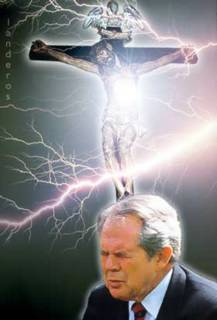
Since the notorious right-wing radical Cristian
Pat Robertson called for the assassination of the President of Venezuela, Hugo Chavez, I thought I would shine some light on what Chavez might be doing to deserve this threat to his life.
First though, a look at Robertson's words: "We don't need another $200 billion war to get rid of one, you know, strong-arm dictator. We have the ability to take him out, and I think the time has come that we exercise that ability." He continued, "It's a whole lot easier to have some of the covert operatives do the job and then get it over with."
I have to agree with the Rev. Barry Lynn, executive director of Americans United for Separation of Church and State, who commented: "It's absolutely chilling to hear a religious leader call for the murder of any political leader, no matter how much he disagrees with such a leader's policies or practices."
Robertson, a former candidate for President of the U.S.A, and current religious leader has presented a fine example of what is so wrong with the religious right who claim to be Christians yet expound words of such violence and hatred.
And now, a look at the works of
Chavez according to a recent joint broadcast with Fidel Castro from Cuba. Chavez was in Cuba to attend a graduation ceremony of over 1600 doctors from the Latin American School of Medicine in Cuba. According to the above linked article, "The Venezuelan president repeated his commitment to create a new Latin American School of Medicine in Venezuela, modeled after the one in Cuba, with the purpose of educating an "army" of doctors."
"Fidel Castro stated that this sort of idea, to create universities intended to create massive amounts of doctors in Latin America, is not a dream, but a reality, focused not on making money but on saving lives."
According to Chavez, "60 comprehensive diagnostic centers are now up and running in Venezuela which have attended to more than 78,000 patients and performed some 300,000 patient examinations since opening." His goal is to open over 600 of these centers throughout Venezuela "to guarantee medical assistance to those most in need that previously had no access to good health care."
These accomplishments and goals may not seem that impressive at first, but consider that these leaders are proposing and enacting a program that will provide quality health care to people of all economic classes, including the extremely poor, of which there are so many in Latin America, and this, completely free of charge. This is being accomplished through the education of large amounts of doctors and other health care workers, also free of charge. Compare this to the U.S., where doctors are becoming less and less while demanding extremely large amounts of money for their services, where the cost of educating a doctor is out of reach for much of the country, and where the cost of health care itself is out of the reach of much of the country. I don't know what Robertson is looking at when speaking of the "dictator" Chavez, but the Venezuelan President appears to have humanitarian ideas at his core. Robertson, a "religious leader" appears to be nothing more than a fascist.
Finally, check out
this article that puts Robertson and others of the religious right in a similar light yet claims this may be a good thing.

